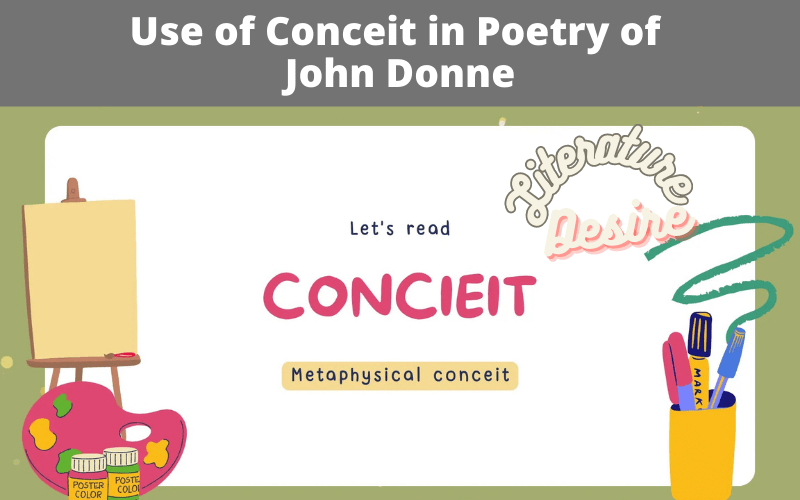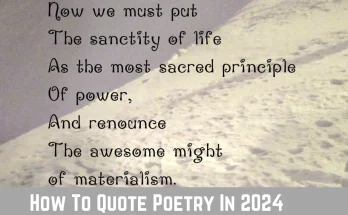John Donne, a prominent English poet of the late 16th and early 17th centuries, is renowned for his skillful use of conceit in his poetry. Conceit refers to an elaborate and extended metaphor or comparison that often defies logic or conventional understanding. In this article, we will explore the various facets of conceit in John Donne’s poetry, analyze select poems, and understand their significance and impact on his work.
Use of Conceit in Poetry of John Donne
John Donne’s poetic genius lies in his ability to weave complex and intricate conceits throughout his verses. Born in 1572, Donne was a key figure in the Metaphysical poetry movement, characterized by its intellectual and philosophical exploration of profound themes.
Conceit, as employed by Donne, adds depth and richness to his poetry, enabling him to express intricate ideas in a captivating and imaginative manner.
Historical Background of Conceit in Poetry
To understand Donne’s use of conceit, it is essential to delve into its historical background. Conceit gained popularity during the Renaissance era, a time of intellectual and artistic revival, as poets sought to display their wit and ingenuity.
The metaphysical poets, including Donne, embraced conceit as a means to explore abstract concepts and draw unexpected connections between seemingly unrelated ideas.
Types of Conceit in John Donne’s Poetry
Donne employed various types of conceits in his poems, each serving a different purpose and adding a unique flavor to his work.
Nature-based conceits drew analogies between elements of the natural world and human experiences, while religious conceits explored spiritual and theological themes.
Love and romantic conceits compared the intensity of emotions to tangible objects, and scientific or philosophical conceits employed imagery from those domains to convey abstract ideas.
Analysis of Select Poems by John Donne
To truly appreciate Donne’s mastery of conceit, let us delve into the analysis of some of his notable poems.
“The Flea” – Exploring the theme of seduction through conceit
In “The Flea,” Donne utilizes the conceit of a flea as a metaphor for the intimate connection between two lovers.
He skillfully intertwines elements of seduction, physical desire, and religious imagery to create a compelling argument for the union of souls.
“A Valediction: Forbidding Mourning” – Love and metaphysical conceits
In this poem, Donne employs metaphysical conceits to express the depth and resilience of true love.
Through comparisons to compasses, spheres, and other metaphors, he beautifully conveys the enduring nature of love and the strength of the bond between two individuals.
“Holy Sonnet XIV” – Religious imagery and conceit
“Holy Sonnet XIV” showcases Donne’s adeptness at utilizing religious conceits. The poem employs a series of paradoxes and vivid metaphors to explore the themes of sin, redemption, and salvation.
Through the conceits of a battering ram and a captured town, Donne illustrates the struggle between the human soul and divine grace.
Significance and Impact of Conceit in John Donne’s Poetry
Donne’s use of conceit has had a profound influence on subsequent generations of poets. His innovative and daring approach to metaphorical language paved the way for the development of metaphysical poetry as a distinct style.
Critics and scholars have analyzed and interpreted Donne’s use of conceit, with some praising his ingenuity and others questioning the coherence and logical consistency of his metaphors.
Conclusion
In conclusion, the use of conceit in John Donne’s poetry is a testament to his brilliance as a poet. His imaginative and thought-provoking metaphors continue to captivate readers and inspire other writers.
Through nature-based, religious, romantic, and scientific conceits, Donne crafted verses that transcend the boundaries of conventional understanding. His legacy endures, and his poetry remains a testament to the power of conceit in creating profound and evocative works of art.
Frequently Asked Questions
Conceit in poetry refers to an elaborate and extended metaphor or comparison that often defies logic or conventional understanding. It allows poets to express complex ideas in a captivating and imaginative manner.
John Donne, a prominent poet of the metaphysical poetry movement, employed conceit extensively in his verses. His innovative and daring use of metaphors paved the way for the development of metaphysical poetry as a distinct style.
Some examples of conceit in Donne’s poetry include comparing lovers to a flea in “The Flea,” exploring the nature of love through metaphysical conceits in “A Valediction: Forbidding Mourning,” and employing religious imagery and conceit in “Holy Sonnet XIV.”
Donne’s use of conceit had a profound impact on subsequent generations of poets. His inventive and thought-provoking metaphors inspired and influenced poets who came after him, shaping the development of poetic devices and styles.
Critics have analyzed and interpreted Donne’s use of conceit in different ways. Some praise his ingenuity and skill in creating metaphors, while others question the coherence and logical consistency of his conceits. The diversity of interpretations highlights the richness and complexity of Donne’s poetic language.



